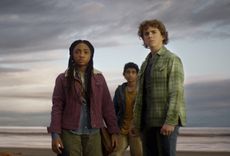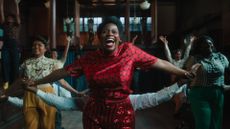2023: the year of superhero fatigue
The year may represent the end of an era for Hollywood


Good news, Martin Scorsese. The era of Hollywood being dominated by superhero movies may be coming to an end.
For more than a decade, comic book films have been ubiquitous and fairly reliable moneymakers, but the genre has suffered a series of shocking failures in 2023 that raise questions about its future. Can superhero films regain the cultural relevance they once had, or does this year suggest there is no going back?
An Avengers-level threat
It was just over a month into 2023 when audiences saw their first tentpole superhero movie — or, more accurately, didn't see it.
Subscribe to The Week
Escape your echo chamber. Get the facts behind the news, plus analysis from multiple perspectives.

Sign up for The Week's Free Newsletters
From our morning news briefing to a weekly Good News Newsletter, get the best of The Week delivered directly to your inbox.
From our morning news briefing to a weekly Good News Newsletter, get the best of The Week delivered directly to your inbox.
"Ant-Man and the Wasp: Quantumania" arrived in February and was billed as a crucial chapter in the Marvel Cinematic Universe, but the movie was a financial disappointment. Despite being advertised as the most must-see "Ant-Man" film yet, it actually grossed less than the previous two, which were largely standalone, low-stakes adventures. This spelled trouble for Marvel's long-term game plan, as "Quantumania" introduced a storyline meant to span multiple films and shows and culminate in an "Avengers" crossover. Audiences, though, just didn't seem interested.
Weeks later, DC's "Shazam! Fury of the Gods" also flopped. The original movie made $140 million domestically in 2019, but the sequel failed to even clear $60 million.
As the year continued, the superhero movie landscape remained mostly bleak. In June, DC's "The Flash" became a historic box office bomb despite being stuffed with the kind of franchise fan service that produced a hit in 2021's "Spider-Man: No Way Home." "Blue Beetle" also disappointed in August, marking DC's third flop of the year — and later this month, "Aquaman and the Lost Kingdom" looks poised to become a fourth.
For Marvel, "Guardians of the Galaxy Vol. 3" offered a bright spot in May, as it grossed a strong $845 million worldwide. Still, despite being the finale of a beloved trilogy, it didn't outperform its predecessor, let alone hit $1 billion like Disney used to do regularly. By November, "The Marvels" was a massive failure, earning the worst opening weekend in MCU history. "Captain Marvel" raked in $1.1 billion in 2019, but the sequel is struggling to crawl past $200 million. Given the film was a culmination of several Marvel TV shows and movies, audiences' indifference signaled another embarrassing repudiation of the MCU's current era.
Out with the old, in with the new
Some have argued these failures can be blamed entirely on the movies themselves not being up to snuff. After all, most of this year's superhero flops earned lukewarm reviews, and Marvel was coming off poorly received films like "Eternals" and "Thor: Love and Thunder" that likely tainted the brand.
But it could also be that audiences are simply burnt out from being flooded with endless superhero content — particularly after Marvel's Disney+ shows were added to the pool in early 2021, making it feel like homework to stay up to date with the franchise. This fall, the second season of "Loki" received positive reviews but still reportedly lost viewers from season 1, suggesting low quality isn't solely to blame. For Marvel, 2019's "Avengers: Endgame" provided such a satisfying finale that it may have given audiences a convenient off-ramp to bail as soon as they sensed that the subsequent films weren't going to be as strong.
The rise of streaming and a shortened window between a film's theatrical release and at-home availability has also made moviegoers pickier about what they watch on the big screen. So a film must now be seen as an event to get them to turn out. For a while, it was almost a given that any new superhero movie, and especially any new MCU movie, was an event. 2023 suggested this is no longer the case, whether the culprit is oversaturation or declining quality.
The success of "Barbie" and "Oppenheimer" also suggested moviegoers are hungry for films that are unlike anything they've seen before. In that environment, it may be more challenging for superhero movies to qualify unless reviews are glowing or there's a particularly strong hook — a hook like, for example, the eye-popping animation of the critically beloved "Spider-Man: Across the Spider-Verse," which shattered expectations over the summer. A film like that, though, doesn't come around often.
Superhero movies' diminished cultural relevance leaves room for another entity to take their place, and video game adaptations are a prime candidate. "The Super Mario Bros. Movie," "Five Nights at Freddy's" and HBO's "The Last of Us" were all hits this year, and Nintendo is already working on a "Legend of Zelda" movie. 2023 may have ushered in an era where Hollywood executives hunt for new franchises not in the inventory of comic book stores, but in the aisles of GameStop.

Continue reading for free
We hope you're enjoying The Week's refreshingly open-minded journalism.
Subscribed to The Week? Register your account with the same email as your subscription.
Sign up to our 10 Things You Need to Know Today newsletter
A free daily digest of the biggest news stories of the day - and the best features from our website
Brendan has worked as a culture writer at The Week since 2018 covering the entertainment industry, including film reviews, television recaps, awards season, the box office, major movie franchises and Hollywood gossip. He has written about film and television for outlets including Bloody Disgusting, Showbiz Cheat Sheet, Heavy and The Celebrity Cafe.
-
 Recipe: roast garlic mushrooms with parsley and eggs by Gelf Alderson
Recipe: roast garlic mushrooms with parsley and eggs by Gelf AldersonThe Week Recommends A simple and classic breakfast combination
By The Week UK Published
-
 Terry Venables: the irrepressible manager with a remarkable footballing brain
Terry Venables: the irrepressible manager with a remarkable footballing brainObituaries 'Brilliant man-manager' who gave England fans some of their best moments of recent times
By The Week UK Published
-
 The Week Unwrapped: Nikki Haley, leaseholds and the death of funerals
The Week Unwrapped: Nikki Haley, leaseholds and the death of funeralsPodcast Has Donald Trump met his match? Will a new law help homebuyers? And why are funerals falling out of favour?
By The Week Staff Published
-
 Places that are already seeing a boost in tourism due to climate change
Places that are already seeing a boost in tourism due to climate changeThe Explainer Warmer temperatures are moving travelers north
By Devika Rao, The Week US Published
-
 The 'Scream' calamity: how a beloved film series collapsed
The 'Scream' calamity: how a beloved film series collapsedUnder the Radar Why the long-running franchise may not recover after losing its leading ladies
By Brendan Morrow, The Week US Published
-
 Archie review: Jason Isaacs stars in ITVX Cary Grant biopic
Archie review: Jason Isaacs stars in ITVX Cary Grant biopicThe Week Recommends Drama explains how Archibald Leach transformed himself into one of Hollywood's biggest stars
By The Week UK Published
-
 What is dark tourism?
What is dark tourism?The Explainer Travelers' fascination with the macabre is not new
By Devika Rao, The Week US Published
-
 Why does Warner Bros. keep canceling finished movies?
Why does Warner Bros. keep canceling finished movies?Under the Radar The studio's decision to scrap multiple completed films isn't sitting well with Hollywood
By Brendan Morrow, The Week US Published
-
 TV to watch in December, from 'Percy Jackson and the Olympians' to 'What If...?'
TV to watch in December, from 'Percy Jackson and the Olympians' to 'What If...?'The Week Recommends Spend your December with Mr. D and Dr. Who
By Brendan Morrow, The Week US Published
-
 Oscars 2024: who will be nominated for the top awards?
Oscars 2024: who will be nominated for the top awards?In Depth Campaigns for 96th Academy Awards are in full swing following the end of the actors' strike
By Julia O'Driscoll, The Week UK Published
-
 Movies to watch in December, from 'Wonka' to 'The Color Purple'
Movies to watch in December, from 'Wonka' to 'The Color Purple'The Week Recommends A month for Beyoncé, Godzilla and Willy Wonka
By Brendan Morrow, The Week US Published










